25 YEARS SINCE FALKLANDS WAR
An interesting article about Britain's military presence in the Falkland Islands to prevent Argentina invading them again....
Mission Atlantic
What are 1,500 British troops doing in the Falklands?
'We don't sit here doing nothing'
by Paula Dear
BBC News

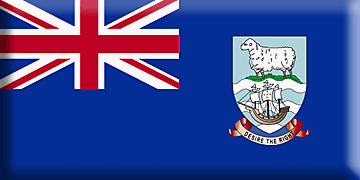
Flag of the Falkland Islands, one of the last vestiges of the British Empire and which rightfully, according to UN law, belong to Britain
One of the many legacies of the 1982 Falklands conflict was the establishment of a sizeable British military base on the islands. Nearly 1,500 service personnel are still posted there. Why are they there and what do they do?
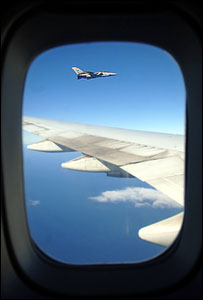
Tornado jets practise intercepting airliners with flights from the UK
THE MISSION
British Forces South Atlantic Islands (BFSAI) should "deter military aggression against the South Atlantic Overseas Territories (SOAT) in order to maintain UK sovereignty ... whilst also protecting Falkland Islands government economic interests".
SOAT: Falkland Islands, Ascension Island, South Georgia and South Sandwich Islands
There has been peace in the South Atlantic archipelago of the Falkland Islands in the 25 years since Argentina invaded, but the territory is still considered to be "operational" by the British government.
An hour's drive south of Stanley, over a bumpy rocky road, is the sprawling Mount Pleasant base, which also houses the families of some military personnel and civilian contractors.
With buildings linked by a central corridor nearly a kilometre (0.6 miles) long it has been nicknamed locally as the Death Star, after the huge planet-destroying space station in the film Star Wars.
The mission there - to deter aggression, maintain UK sovereignty and protect the Falklands government's economic interests - is a joint one for the RAF, Army and navy.
There are both political and military objectives in the British Forces South Atlantic Islands (BFSAI) operation, says Cdr Chris Moorey.
Argentina has maintained its claim to the Falklands [Las Malvinas] since 1833 and there is no sign of that position changing.
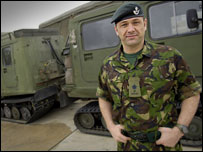
"To do all this in the UK, it would be difficult to get it all together - that's important, because they will do it for real in Afghanistan"
Major Stuart Lane
The Argentine President, Nestor Kirchner is from Patagonia - in the south of the country - and "very much has Las Malvinas on his mind," says Cdr Moorey.
But while the political situation is clearly something the military must monitor, in the current climate they are more likely to be engaged in "protecting the economic zone" such as the islands' fisheries area, he adds.
One of their principal routine duties is to patrol the islands - by land, air and sea. That can mean anything from a small Army team trekking with packs, calling in on settlements and sleeping in farmer's sheds, to RAF pilots patrolling in low-flying Tornado jets or navy vessels touring the seas.
And it is the tri-service nature of the operation that is often cited as the main reason a Falklands posting can be seen as attractive.
It may not have the action of Iraq or Afghanistan, but the location provides a near-perfect microcosm of all the training opportunities you could wish for, according to Maj Stuart Lane, of the Roulement Infantry Company (RIC).
Maj Lane, an Australian who took an attachment to the British army then stayed, says his company will be making the most of its eight-week posting - far shorter than the six months most Army colleagues serve.
The field firing on the islands is the "best training" they have, he says. They can also take advantage of working with the four Tornado F3s on the base, a Hercules C130, Sea King helicopters and navy vessels, he says.
"Opportunity wise, it's fantastic. People have really made the effort down here to look after the blokes. A lot of them have asked to stay."
"To do all this in the UK, it would be difficult to get it all together. We have a lot of places to play here. And that's important, because they will do it for real in Afghanistan."
"This was our opportunity to come to this part of the world. Eight of my blokes will get to go on HMS Endurance and travel to Antarctica, who gets that?"
Top Gun
Suggestions that being posted to the Falklands could be perceived as boring are met with scorn.
"No commander would come here without taking advantage of all the different assets here. And we have a real operation to do. If the people here want to belong to Britain we will defend them.
"The fact that there are not bombs flying around is a good thing, because it allows us to train. We don't just sit here and do nothing."
In the Quick Reaction Air building pilots and navigators are sitting in a recreation room in their flight gear.
A communications unit attached to the wall could bring their tea break to an abrupt halt. If it goes off "we will all have to go", they say.
If anyone unidentified comes into the Falklands' protected zone they are scrambled, which happens about once or twice a month, they say. In the last incident the unidentified object was a civilian aircraft.
The job is like sailing, says Flt Lt Kat Ferris: "It's 95% sitting around, 5% terror."
To deal with the sitting around, there are some exceptionally comfortable armchairs and a bank of DVDs on a bookshelf next to the communications unit.
Top Gun is on the bottom shelf.
But, like their colleagues, they say the training available on the islands is pretty special and air crews are kept busy for much of their six-week posting.
"Here we can do other things, like low flying. The Argentines would still come in at very low levels," says Flt Lt Ferris.
They also have the chance to practise intercepting airliners, with the twice-weekly flights, carrying military and civilian passengers, from RAF Brize Norton in the UK.
"That is a skill set we can't get at home. With a view to September 11-type incidents, getting to intercept an airliner is excellent training. As a high-altitude interceptor the Tornado can struggle a bit so it's not as easy as it looks."
But it is not all just about using the place to update their skills, adds Major Lane.
"What makes this place important is that we all grew up with 1982. We took lessons from that and adapted what we did. The blokes walk over those battlefields and learn about what their predecessors did.
"That means a lot to them."
BRITISH CAPABILITIES - AIR, LAND, SEA - IN THE FALKLANDS
One VC10: air-to-air refuelling, support for Tornado operations, medical evacuation
One Hercules C130: maritime radar reconnaissance
Four Tornado F3s: 24-hour quick reaction alerts and air patrol sorties
Resident Rapier Battery: ground-based air defence
Various Army units plus the independent unit Roulement Infantry Company
Atlantic patrol: navy frigate or destroyer for south Atlantic/West Africa regions
Falkland Island patrol vessel: air and surface radar surveillance, coastal and offshore patrols
Royal Fleet Auxiliary: usually tied to Atlantic Patrol
MV St Brandan: civilian ship providing logistical support - coastal re-supply
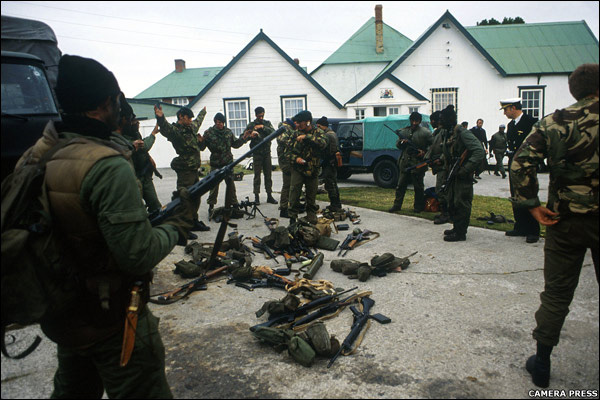
To begin our series on the Falklands War, 25 years on, we present some of the memorable images from the conflict. On 2 April 1982 Argentina illegally invaded the Falkland Islands, one of the last vestiges of the British Empire. The photo above shows a small contingent of Royal Marines being overrun by an Argentine force ending nearly 150 years of British rule - and so starting the Falklands War when Britain sent a huge Armada of 100 Royal Navy ships to the islands
-------------------------------------------------
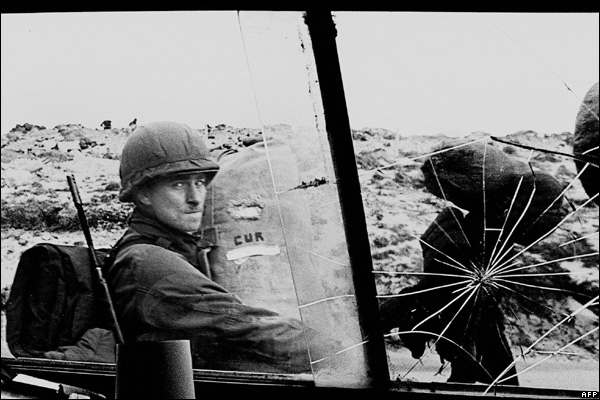
For the Argentines the British possession of the islands - which they called the Malvinas - was a long-standing affront to national pride. They traced their claim back to the days of the Spanish empire, of which both the Falklands and Argentina had been a part.
-------------------------------------------------
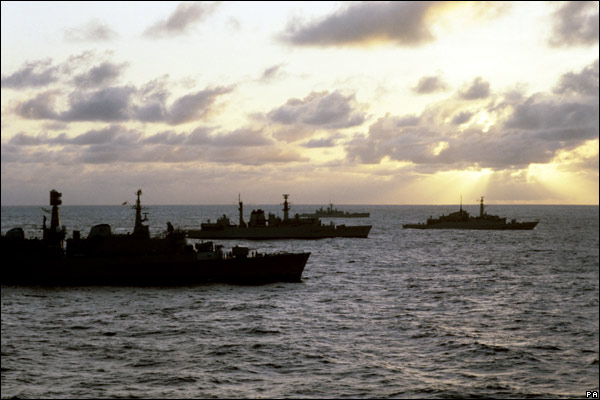
Much to the surprise of Argentina, Britain’s government, led by Margaret Thatcher, proclaimed it was prepared to fight to reclaim the islands and ordered a task force to be assembled to fight a war 8,000 miles away from the British Isles.
---------------------
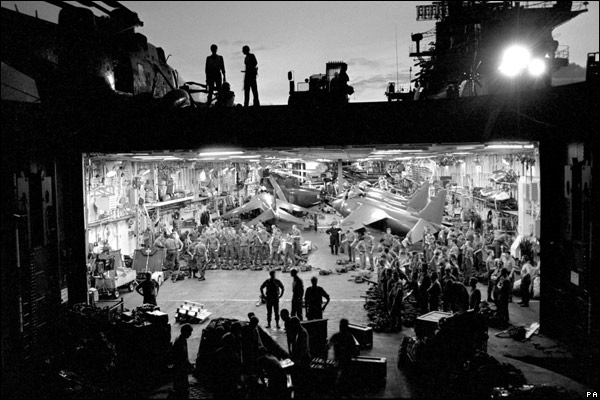
British naval power: By 5 April the first of more than 100 Royal Navy ships set sail for the South Atlantic carrying 27,000 personnel. The UN Security Council threw its weight behind the British claim to the islands and US Secretary of State Alexander Haig attempted to find a diplomatic solution.
-------------------------------------
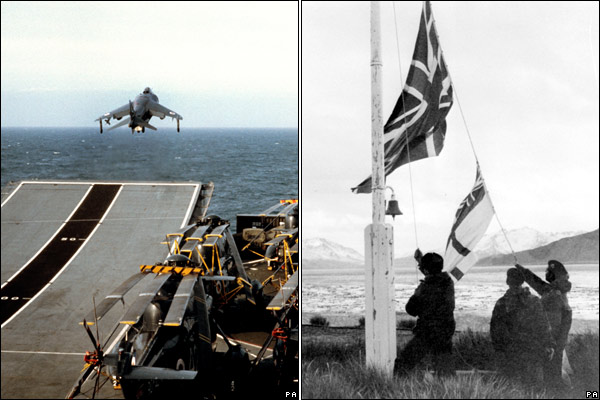
On 7 April the British set up a 200-mile military exclusion zone around the Falklands - it came into force on 12 April. Keen to keep up momentum and provide an early success the British re-took the small island of South Georgia, raising the union jack on 25 April.
---------------------------------
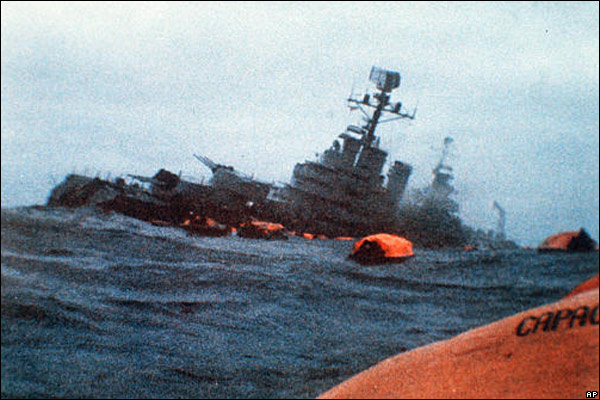
The British task force depended on its two aircraft carriers and it was with this in mind that Mrs Thatcher said she permitted the controversial sinking by nuclear submarine HMS Conqueror of Argentine cruiser General Belgrano, resulting in the deaths of 368 of her crew.
--------------------------
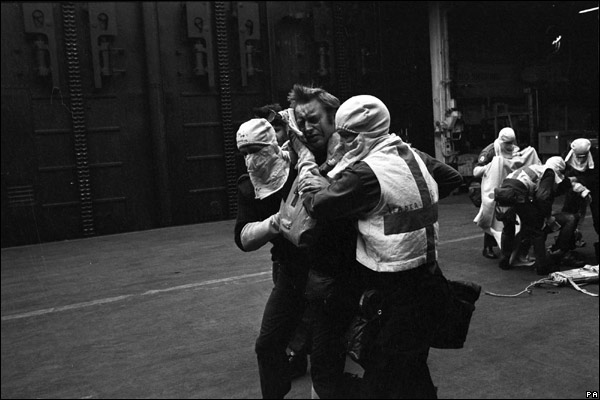
The Royal Navy was soon to suffer its first casualties when 22 men were killed on HMS Sheffield. The destroyer was hit by an Exocet missile, which despite its failure to explode drove a hole in the ship's side.
--------------------------

On 20 May UN-sponsored peace talks failed. Within 24 hours UK special forces and Royal Marines stormed ashore and established a beachhead at San Carlos on East Falkland. The night landings - undertaken during a gale - achieved complete surprise.
---------------------------
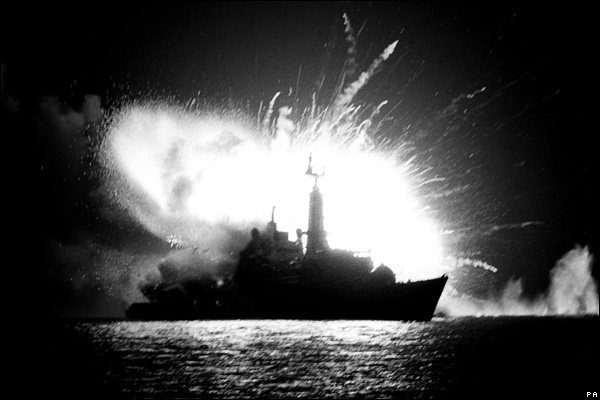
Argentine air attacks proved costly, and before the beachhead broke out HMS Ardent, Antelope and Coventry were all sunk. The Atlantic Conveyor also went down with the loss of its troop-carrying Chinook helicopters, and key equipment necessary to re-capture the islands.
--------------------------------------
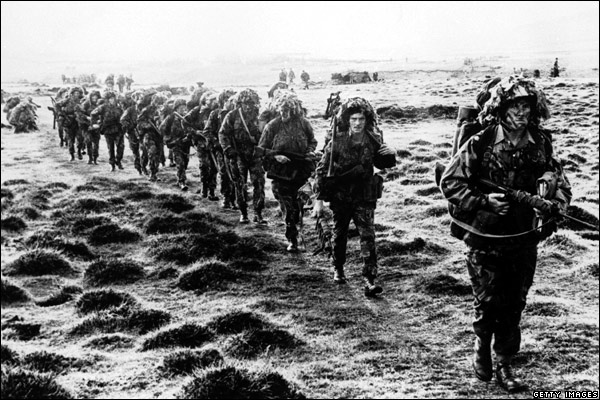
Without the heavy helicopters the British troops had to march to their first major objective – the heavily defended settlement at Goose Green. Colonel H Jones led 2 Para to victory, but was killed during the assault. He was later awarded the Victoria Cross.
------------------------------
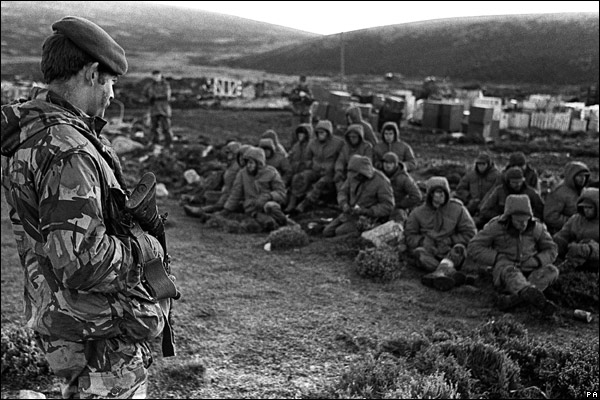
The Battle of Goose Green had claimed nearly 250 Argentine and just 18 British soldiers’ lives, with many more wounded and over 1,000 Argentines taken prisoner by the British (as shown above). Now the British forces could begin their preparations to take the final prize, the Falklands' capital Stanley. The Falklands War saw 255 British soldiers killed and 655 Argentinian soldiers killed.
news.bbc.co.uk
***************************************************
The Falklands: The Next generation
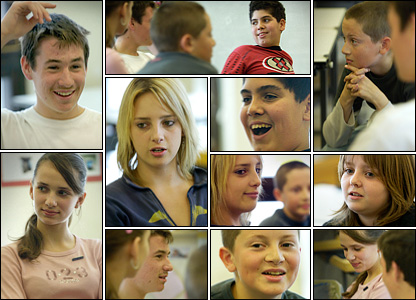
Falkland Islands children
By Paula Dear
BBC News
Memories of the bloody battles seen on the Falkland Islands in 1982 are bound to be fading. Many of those who were children then now have children of their own. What do today's youngsters feel about the place in which they live and what are their thoughts on the future?
Life can be muddling enough for a teenager, but for 15-year-old Pamela D'Avino, coming from Argentina and living in the Falklands can leave her feeling somewhat torn.
With the long slow build-up to the conflict's 25th anniversary commemorations in June, Pam says things feel a bit "tense".
The teenager - who moved to the Falklands aged six with her Argentine father and her mother, a local - says being born in Buenos Aires can makes things "difficult".
"You get the odd people bringing it up sometimes".
"I'd stick up for the Falklands, but I'd stick up for Argentina too. It's just so weird and confusing."
But, chips in her classmate Tom Burston, there's "nothing wrong with the Argentine people, it was the government of the time that was wrong".
Tom and Pam have gathered in a classroom with four other pupils from the islands' secondary school, which caters for about 160 children aged 11-16.
One of their history teachers is writing a unit on the Falklands conflict, which will have to fit in with the UK curriculum the school follows. To date there has been no formal teaching of the war, although the school is required to inform the children about the principle of self-determination.
CHILDREN OF THE NINETIES
Tom Burston, 16, born Falkland Islands
Pamela D'Avino, 15, born Argentina; lived in Falklands for nine years
Nadia Arkhipkina, 15, born Russia; lived in Falklands for nine years
Murray Middleton, 13, born UK; lived on islands for four years
Nick Roberts, 12, born Falkland Islands
Ariane Goss, 11, born Falkland Islands
But for the most part the group are not giving the Falklands conflict much thought at all. They are simply getting on with the job of being teenagers.
There are probably few places in the world where you won't hear young people complain that the place in which they live is "boring".
"There's nothing to do down here," says Pam.
"In bigger countries you get clubs for kids from the age of 10. We'd just like a small café to chill out in."
Murray Middleton, 13, is from the UK and has lived on the islands for four years. Some aspects of life here are "more fun" he says, but he explains that going to the cinema involves a 35-mile (56km) drive to use the facilities at the British military base south of Stanley.
"But the films come out three months after they come out in England. Sometimes they are already out on DVD before they come here."
The government keeps planning something else for youngsters to do, says Nick Roberts, 12, "but they don't do anything about it".
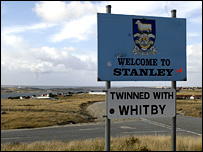
Twinned with Whitby, Yorkshire: The children often make comparisons with the UK
Comparisons with the UK crop up regularly.
"There's kids in England who complain if there's one night they can't go to a club!" says Nick.
"And they've got amusement arcades, skate parks and everything...," adds Murray.
But it does later transpire that a building set aside for young people to meet in - albeit opposite the police station in Stanley - has recently been closed due to vandalism.
Boredom often leads to underage smoking and drinking, the group says.
"Most of the kids my age are smoking," says 11-year-old Ariane.
'No safety worries'
So far, so teenage. But there are notable differences between this group and the typical British youth.
When asked what they like about living in Stanley they all agree that safety is one of the biggest plus points.
Children can stay out late at night and "not worry about being robbed or stabbed".
Mobile phone thefts do not happen, bullying is not an issue and no-one carries knives, they say.
"This is the closest we get," laughs Tom, brandishing a plastic fork.
Ariane adds: "You could walk around with a big wad of cash here and not worry."
As we speak there has been a recent spate of stabbings on Britain's streets. The children watch UK news and soap operas, and are well aware of what's going on 8,000 miles north.
"It freaks you out. You see it every day that another kid's been stabbed," says Ariane.
Their interest does not simply stem from the familial, political and historical connections they have with Britain. One day soon most, if not all, of them will have to move to the UK to continue their education beyond GCSE-level.
The Falklands does not have the population or infrastructure to cater for higher or further education, although every child's studies is funded by the islands' government.
About half continue beyond 16 each year and the school has a close relationship with two colleges in Winchester and Chichester, which cater for the vast majority of Falklands pupils.
Tom, Pam and Russian-born Nadia Arkhipkina are the eldest and will be heading off soon if they make the grades.

Clockwise from front left: Murray, Tom, Nick, Ariane, Nadia and Pam - life is safe but can be boring.
While Pam will miss her family but be happy to leave the Falklands, Tom feels the opposite.
Nadia is planning to go to [Peter Symonds' Sixth Form College] Winchester: "I think I might do art. I think I'd miss my family a lot but it would be a new experience. I'd enjoy everything about it!"
The sheer isolation of the islands forces these youngsters into thinking about their future at a relatively young age.
Pam thinks she would like to live in the US but "come back for holidays" while Murray wants to be a lawyer and already has plans to flatshare with a mate in the UK.
A career in design is the choice for Nadia "but not down here. I would like France or Italy," she says.
Nick is not sure but knows he will always want to live by the sea and Ariane plans on becoming a history teacher in the Falklands.
As for Tom, he's pretty sure where he'll go once he has finished his studies: "You'd be crazy not to want to come back here, at least you won't get stabbed."
news.bbc.co.uk
An interesting article about Britain's military presence in the Falkland Islands to prevent Argentina invading them again....
Mission Atlantic
What are 1,500 British troops doing in the Falklands?
'We don't sit here doing nothing'
by Paula Dear
BBC News


Flag of the Falkland Islands, one of the last vestiges of the British Empire and which rightfully, according to UN law, belong to Britain
One of the many legacies of the 1982 Falklands conflict was the establishment of a sizeable British military base on the islands. Nearly 1,500 service personnel are still posted there. Why are they there and what do they do?

Tornado jets practise intercepting airliners with flights from the UK
THE MISSION
British Forces South Atlantic Islands (BFSAI) should "deter military aggression against the South Atlantic Overseas Territories (SOAT) in order to maintain UK sovereignty ... whilst also protecting Falkland Islands government economic interests".
SOAT: Falkland Islands, Ascension Island, South Georgia and South Sandwich Islands
There has been peace in the South Atlantic archipelago of the Falkland Islands in the 25 years since Argentina invaded, but the territory is still considered to be "operational" by the British government.
An hour's drive south of Stanley, over a bumpy rocky road, is the sprawling Mount Pleasant base, which also houses the families of some military personnel and civilian contractors.
With buildings linked by a central corridor nearly a kilometre (0.6 miles) long it has been nicknamed locally as the Death Star, after the huge planet-destroying space station in the film Star Wars.
The mission there - to deter aggression, maintain UK sovereignty and protect the Falklands government's economic interests - is a joint one for the RAF, Army and navy.
There are both political and military objectives in the British Forces South Atlantic Islands (BFSAI) operation, says Cdr Chris Moorey.
Argentina has maintained its claim to the Falklands [Las Malvinas] since 1833 and there is no sign of that position changing.

"To do all this in the UK, it would be difficult to get it all together - that's important, because they will do it for real in Afghanistan"
Major Stuart Lane
The Argentine President, Nestor Kirchner is from Patagonia - in the south of the country - and "very much has Las Malvinas on his mind," says Cdr Moorey.
But while the political situation is clearly something the military must monitor, in the current climate they are more likely to be engaged in "protecting the economic zone" such as the islands' fisheries area, he adds.
One of their principal routine duties is to patrol the islands - by land, air and sea. That can mean anything from a small Army team trekking with packs, calling in on settlements and sleeping in farmer's sheds, to RAF pilots patrolling in low-flying Tornado jets or navy vessels touring the seas.
And it is the tri-service nature of the operation that is often cited as the main reason a Falklands posting can be seen as attractive.
It may not have the action of Iraq or Afghanistan, but the location provides a near-perfect microcosm of all the training opportunities you could wish for, according to Maj Stuart Lane, of the Roulement Infantry Company (RIC).
Maj Lane, an Australian who took an attachment to the British army then stayed, says his company will be making the most of its eight-week posting - far shorter than the six months most Army colleagues serve.
The field firing on the islands is the "best training" they have, he says. They can also take advantage of working with the four Tornado F3s on the base, a Hercules C130, Sea King helicopters and navy vessels, he says.
"Opportunity wise, it's fantastic. People have really made the effort down here to look after the blokes. A lot of them have asked to stay."
"To do all this in the UK, it would be difficult to get it all together. We have a lot of places to play here. And that's important, because they will do it for real in Afghanistan."
"This was our opportunity to come to this part of the world. Eight of my blokes will get to go on HMS Endurance and travel to Antarctica, who gets that?"
Top Gun
Suggestions that being posted to the Falklands could be perceived as boring are met with scorn.
"No commander would come here without taking advantage of all the different assets here. And we have a real operation to do. If the people here want to belong to Britain we will defend them.
"The fact that there are not bombs flying around is a good thing, because it allows us to train. We don't just sit here and do nothing."
In the Quick Reaction Air building pilots and navigators are sitting in a recreation room in their flight gear.
A communications unit attached to the wall could bring their tea break to an abrupt halt. If it goes off "we will all have to go", they say.
If anyone unidentified comes into the Falklands' protected zone they are scrambled, which happens about once or twice a month, they say. In the last incident the unidentified object was a civilian aircraft.
The job is like sailing, says Flt Lt Kat Ferris: "It's 95% sitting around, 5% terror."
To deal with the sitting around, there are some exceptionally comfortable armchairs and a bank of DVDs on a bookshelf next to the communications unit.
Top Gun is on the bottom shelf.
But, like their colleagues, they say the training available on the islands is pretty special and air crews are kept busy for much of their six-week posting.
"Here we can do other things, like low flying. The Argentines would still come in at very low levels," says Flt Lt Ferris.
They also have the chance to practise intercepting airliners, with the twice-weekly flights, carrying military and civilian passengers, from RAF Brize Norton in the UK.
"That is a skill set we can't get at home. With a view to September 11-type incidents, getting to intercept an airliner is excellent training. As a high-altitude interceptor the Tornado can struggle a bit so it's not as easy as it looks."
But it is not all just about using the place to update their skills, adds Major Lane.
"What makes this place important is that we all grew up with 1982. We took lessons from that and adapted what we did. The blokes walk over those battlefields and learn about what their predecessors did.
"That means a lot to them."
BRITISH CAPABILITIES - AIR, LAND, SEA - IN THE FALKLANDS
One VC10: air-to-air refuelling, support for Tornado operations, medical evacuation
One Hercules C130: maritime radar reconnaissance
Four Tornado F3s: 24-hour quick reaction alerts and air patrol sorties
Resident Rapier Battery: ground-based air defence
Various Army units plus the independent unit Roulement Infantry Company
Atlantic patrol: navy frigate or destroyer for south Atlantic/West Africa regions
Falkland Island patrol vessel: air and surface radar surveillance, coastal and offshore patrols
Royal Fleet Auxiliary: usually tied to Atlantic Patrol
MV St Brandan: civilian ship providing logistical support - coastal re-supply

To begin our series on the Falklands War, 25 years on, we present some of the memorable images from the conflict. On 2 April 1982 Argentina illegally invaded the Falkland Islands, one of the last vestiges of the British Empire. The photo above shows a small contingent of Royal Marines being overrun by an Argentine force ending nearly 150 years of British rule - and so starting the Falklands War when Britain sent a huge Armada of 100 Royal Navy ships to the islands
-------------------------------------------------

For the Argentines the British possession of the islands - which they called the Malvinas - was a long-standing affront to national pride. They traced their claim back to the days of the Spanish empire, of which both the Falklands and Argentina had been a part.
-------------------------------------------------

Much to the surprise of Argentina, Britain’s government, led by Margaret Thatcher, proclaimed it was prepared to fight to reclaim the islands and ordered a task force to be assembled to fight a war 8,000 miles away from the British Isles.
---------------------

British naval power: By 5 April the first of more than 100 Royal Navy ships set sail for the South Atlantic carrying 27,000 personnel. The UN Security Council threw its weight behind the British claim to the islands and US Secretary of State Alexander Haig attempted to find a diplomatic solution.
-------------------------------------

On 7 April the British set up a 200-mile military exclusion zone around the Falklands - it came into force on 12 April. Keen to keep up momentum and provide an early success the British re-took the small island of South Georgia, raising the union jack on 25 April.
---------------------------------

The British task force depended on its two aircraft carriers and it was with this in mind that Mrs Thatcher said she permitted the controversial sinking by nuclear submarine HMS Conqueror of Argentine cruiser General Belgrano, resulting in the deaths of 368 of her crew.
--------------------------

The Royal Navy was soon to suffer its first casualties when 22 men were killed on HMS Sheffield. The destroyer was hit by an Exocet missile, which despite its failure to explode drove a hole in the ship's side.
--------------------------

On 20 May UN-sponsored peace talks failed. Within 24 hours UK special forces and Royal Marines stormed ashore and established a beachhead at San Carlos on East Falkland. The night landings - undertaken during a gale - achieved complete surprise.
---------------------------

Argentine air attacks proved costly, and before the beachhead broke out HMS Ardent, Antelope and Coventry were all sunk. The Atlantic Conveyor also went down with the loss of its troop-carrying Chinook helicopters, and key equipment necessary to re-capture the islands.
--------------------------------------

Without the heavy helicopters the British troops had to march to their first major objective – the heavily defended settlement at Goose Green. Colonel H Jones led 2 Para to victory, but was killed during the assault. He was later awarded the Victoria Cross.
------------------------------

The Battle of Goose Green had claimed nearly 250 Argentine and just 18 British soldiers’ lives, with many more wounded and over 1,000 Argentines taken prisoner by the British (as shown above). Now the British forces could begin their preparations to take the final prize, the Falklands' capital Stanley. The Falklands War saw 255 British soldiers killed and 655 Argentinian soldiers killed.
news.bbc.co.uk
***************************************************
The Falklands: The Next generation

Falkland Islands children
By Paula Dear
BBC News
Memories of the bloody battles seen on the Falkland Islands in 1982 are bound to be fading. Many of those who were children then now have children of their own. What do today's youngsters feel about the place in which they live and what are their thoughts on the future?
Life can be muddling enough for a teenager, but for 15-year-old Pamela D'Avino, coming from Argentina and living in the Falklands can leave her feeling somewhat torn.
With the long slow build-up to the conflict's 25th anniversary commemorations in June, Pam says things feel a bit "tense".
The teenager - who moved to the Falklands aged six with her Argentine father and her mother, a local - says being born in Buenos Aires can makes things "difficult".
"You get the odd people bringing it up sometimes".
"I'd stick up for the Falklands, but I'd stick up for Argentina too. It's just so weird and confusing."
But, chips in her classmate Tom Burston, there's "nothing wrong with the Argentine people, it was the government of the time that was wrong".
Tom and Pam have gathered in a classroom with four other pupils from the islands' secondary school, which caters for about 160 children aged 11-16.
One of their history teachers is writing a unit on the Falklands conflict, which will have to fit in with the UK curriculum the school follows. To date there has been no formal teaching of the war, although the school is required to inform the children about the principle of self-determination.
CHILDREN OF THE NINETIES
Tom Burston, 16, born Falkland Islands
Pamela D'Avino, 15, born Argentina; lived in Falklands for nine years
Nadia Arkhipkina, 15, born Russia; lived in Falklands for nine years
Murray Middleton, 13, born UK; lived on islands for four years
Nick Roberts, 12, born Falkland Islands
Ariane Goss, 11, born Falkland Islands
But for the most part the group are not giving the Falklands conflict much thought at all. They are simply getting on with the job of being teenagers.
There are probably few places in the world where you won't hear young people complain that the place in which they live is "boring".
"There's nothing to do down here," says Pam.
"In bigger countries you get clubs for kids from the age of 10. We'd just like a small café to chill out in."
Murray Middleton, 13, is from the UK and has lived on the islands for four years. Some aspects of life here are "more fun" he says, but he explains that going to the cinema involves a 35-mile (56km) drive to use the facilities at the British military base south of Stanley.
"But the films come out three months after they come out in England. Sometimes they are already out on DVD before they come here."
The government keeps planning something else for youngsters to do, says Nick Roberts, 12, "but they don't do anything about it".

Twinned with Whitby, Yorkshire: The children often make comparisons with the UK
Comparisons with the UK crop up regularly.
"There's kids in England who complain if there's one night they can't go to a club!" says Nick.
"And they've got amusement arcades, skate parks and everything...," adds Murray.
But it does later transpire that a building set aside for young people to meet in - albeit opposite the police station in Stanley - has recently been closed due to vandalism.
Boredom often leads to underage smoking and drinking, the group says.
"Most of the kids my age are smoking," says 11-year-old Ariane.
'No safety worries'
So far, so teenage. But there are notable differences between this group and the typical British youth.
When asked what they like about living in Stanley they all agree that safety is one of the biggest plus points.
Children can stay out late at night and "not worry about being robbed or stabbed".
Mobile phone thefts do not happen, bullying is not an issue and no-one carries knives, they say.
"This is the closest we get," laughs Tom, brandishing a plastic fork.
Ariane adds: "You could walk around with a big wad of cash here and not worry."
As we speak there has been a recent spate of stabbings on Britain's streets. The children watch UK news and soap operas, and are well aware of what's going on 8,000 miles north.
"It freaks you out. You see it every day that another kid's been stabbed," says Ariane.
Their interest does not simply stem from the familial, political and historical connections they have with Britain. One day soon most, if not all, of them will have to move to the UK to continue their education beyond GCSE-level.
The Falklands does not have the population or infrastructure to cater for higher or further education, although every child's studies is funded by the islands' government.
About half continue beyond 16 each year and the school has a close relationship with two colleges in Winchester and Chichester, which cater for the vast majority of Falklands pupils.
Tom, Pam and Russian-born Nadia Arkhipkina are the eldest and will be heading off soon if they make the grades.

Clockwise from front left: Murray, Tom, Nick, Ariane, Nadia and Pam - life is safe but can be boring.
While Pam will miss her family but be happy to leave the Falklands, Tom feels the opposite.
Nadia is planning to go to [Peter Symonds' Sixth Form College] Winchester: "I think I might do art. I think I'd miss my family a lot but it would be a new experience. I'd enjoy everything about it!"
The sheer isolation of the islands forces these youngsters into thinking about their future at a relatively young age.
Pam thinks she would like to live in the US but "come back for holidays" while Murray wants to be a lawyer and already has plans to flatshare with a mate in the UK.
A career in design is the choice for Nadia "but not down here. I would like France or Italy," she says.
Nick is not sure but knows he will always want to live by the sea and Ariane plans on becoming a history teacher in the Falklands.
As for Tom, he's pretty sure where he'll go once he has finished his studies: "You'd be crazy not to want to come back here, at least you won't get stabbed."
news.bbc.co.uk
Last edited: